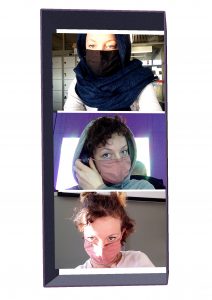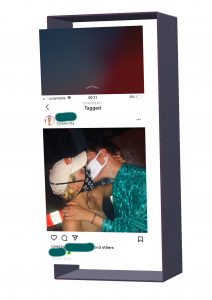During the first lockdown in March 2020, my whole family freaked out. We thought it was the end of the world. My brother traveled home to Europe from California where he was studying and for the first days, he wore a mask that I had never seen before. It was shaped like a bird’s beak, with two crossing strips of material and sort of pointy in the front. He reminded me of the plague doctors in the 17th century as he slumped around the house, his head drooped in the pointy mask. In those days my mother was scrubbing her hands so frequently with vinegar and bleach she developed a rash. It was chaos.
I teased my brother about it at the beginning until he told me “it’s an N95, my girlfriend gave it to me & they are impossible to get Klara. I can’t believe you’ve never seen one.”

So the mask, the mask actually makes me feel sexier. I walk down the street and each look I receive seems deeper and more intense. As if for lack of other signifiers the eyes become the one thing we can hook on to. It also makes me feel safer, I can maintain eye contact longer than usual. I sense more longing somehow. I feel matrixi a bit, whooshing around with a secret purpose. I sometimes forget I am wearing it. I take it off when I realize, struggling on the bike to rip it off with some sense of urgency, even though it makes me feel warm and protected. But I take it off out of some intuitive principle, to be a human. To expose my human signifiers.
The Austrian chancellor Sebastian Kurz observed that the resistance toward public mask-wearing in Europe stems from the theological roots of Western life. There is an innate belief that the truth is “unveiled”, and that the face is where our personhood is represented. The uncovered mouth betrays our deepest selves. The chancellor mused that this mask resistance is subtly linked to the European resistance to Islamic face-veiling. The act of unveiling features prominently in Christian liturgy, and this part of our history maintains that the only way to truly know God is to see him face-to-face. In Islam, Allah is veiled in light, and mortals cannot face him in this life. Similar to the Christian belief, to face him in the next life is considered the greatest honor and blessing and the only way one can know Truth.

The word mask in itself has sinister roots in different languages; the French word masque means ‘to guard the face’, in Catalan mascara mans ‘blackening the face’ and the Latin word masca means ‘nightmare’. No wonder covering one’s face is often identified with danger and criminality. The mask is used to hide one’s identity, one’s ultimate truth. Worn to signal a threat to others from the safe confines of anonymity. Worn by bank robbers and hooligans. Worn by protestors and the French Black Block, an anarchist organization that move en masse, all dressed in black and their faces completely masked. They attack and damage storefronts and other symbols of capitalism, and when the police try to arrest one of the Black Block, the other members swarm around the policemen like locus and free their endangered comrade. They work as a hive, empowered by their lack of facial features and unique signifiers.
At the beginning of the pandemic, it was awkward wearing one. Often I felt judged by my radical liberal friends as if I was buying into this plot, this narrative our institutions impose upon us poor plebs. The mandatory mask as a critical stage in conditioning us to accept abuses of our liberties. For the greater good though. I also felt judged for not wearing one in a public space where everyone else was masked as if I was not doing my best to protect society. At the beginning of the pandemic, when we were still less accustomed to it, I received judgmental looks, whether I wore it or not. Or maybe I’m paranoid.
The mask itself has become a signifier, how you wear it and why, a mark of social recognition. The symbol of a mask is emotional, and a site for cultural and political wars. It is not purely a vessel of public health.
Todd McGowan, an American academic studying the politics of the pandemic writes: “Wearing a mask indicates a stance of universality, a liberal belief that you are never simply yourself but always extend into the other, just as the other extends into you.” Universality as a belief that society should be built around the principle of mutual protection. The masked symbolize their belief of being part of a larger tribe, a tribe that doesn’t recognize other masked people as isolated subjects but rather as intrinsically bound to each other. A vision of society that is distinctly anti-capitalist, fighting the prioritizing of isolated individuals as a critique of the ruling liberal philosophy.
According to McGowan, the conservative inclination toward rejecting the mask is in fact rejecting universality and the wider collective. A capitalist approach in the sense that each subject pursues their own identity and interests regardless of its effect on others. The reason why the mask is often ridiculed by representatives of conservative parties, like Trump, Bolasanaro, and the Dutch Thierry Baudet is that “the obstruction of universality is a precondition for the right-wing populist practices, which are based on acquiring an identity through the attachment to a national, religious or ethnic project.” The identity of universalism as demonstrated by the willingness to wearing a mask is thus a barrier to populism, as it offers a universal and inherently compassionate identity.

The added value of libidinal enjoyment drawn from the transgressive thrill of disobeying the social norm only makes the conservative populist agenda more potent, and the possibility of not wearing a mask more exciting.
Though polls do suggest that more conservatives reject masks, the main reason referred to regardless of political identification is the curbing of civil liberties. The term ‘psychological reactance’ aptly fits this phenomenon, which is described by S. Taylor and G. Asmundsonas as a “motivational response to rules, regulation, or attempts at persuasion that are perceived as threatening ones sense of control, autonomy and freedom of choice.”
The feeling of losing control can be universally applied to citizens struggling to see their impact within a quickly spiraling corporatized and digitally bureaucratized world. It’s too easy to draw the line between liberal and conservative, universal and particular, selfless and selfish. This analysis of separating the universalists from the individualists is general enough to make sense, but does not address the morphing boundaries of a post-truth era where the rules that governed political philosophy in the 20th century do not fully apply.
The anti-mask and anti-Covid regulation protests that unfolded all over the world in fact consisted of people across the political spectrum. As the New York Times reported when covering the Covid lockdown protests in Germany; “It was a bizarre mix of people: families and senior citizens were joined by right-wing extremists, some sporting swastika tattoos.”
The interesting thing that mandatory mask-wearing triggered was a union of the radicals, as demonstrated by the horseshoe theory. The horseshoe theory states that the political continuum is not linear but bent, like a horseshoe, with the most extreme divisions of each camp almost touching in their beliefs. Thus my radical liberal friends may draw information from radical right-wing news channels that support their theories concerning the negative and yet unknown long-term effects of vaccinations and the conspiratorial origins of the Covid battling regulations. Regardless of the outlandishness of most conspiracy theories, they are all tied to an unwavering distrust in traditional media which includes the distrust of traditional scientific methods.
The far ends of the polarized left and right are remote enough on the spectrum of political poles to unite in their belief which is essentially a deep distrust of the current governing organs and the whole political infrastructure in its core; ie. “the system”. The distrust of masks in this context represents crumbling faith in institutions and representative democracy itself and is a reflection not only on the pandemic but on the wider expanse of our political climate. There need not be complex psychological adjustments in mask marketing, because the core of the issue lies with the weakening pillars of confidence that are necessary for a well-functioning society; confidence in ourselves, confidence in others, and confidence in institutions. All three constituents of that confidence condition each other – taking out one and the other two would implode and collapse. (Zygmunt Bauman)

To be clear and on the record; the mask you choose and how you wear it can potentially protect people around you from exposure to your viral load.
Under-the-nose/around the wrist; The basic ones, the sheep. They follow regulations but when they wear the mask it is under the nose or somewhat loose, which has no effect whatsoever. They do not wear a mask to actually prevent the potential spread of the infection but do so because one must. They demonstrate their detachment from political engagement by passively following rules.
Ear danglers; the chillers. They slip their mask on fully when they see an elderly couple approaching who seem visibly scared. They don’t mind getting infected themselves and feel the corona crisis is overblown but what can you do.
Under-the-chinners; are in the same category as the ear danglers but different than the under-the-nosers. They show their disregard for prevention and wear it almost as an accessory, the cool-girl attitude of “hey, I’m wearing it ok?”. They enjoy analyzing the current political scape. They are not as radical as the position they choose to represent in these discussions.
The hidden pocket; those whose masks are stuffed in their pocket, so If they can’t enter the bus because the driver doesn’t allow them they pull out this grimy fuzzy thing and put it on in the most necessary of situations. They believe the corona is a farce and dream of living on a farm as a legitimate life direction. They hide their masks.
The real maskers; are seldom seen and far in between. They avoid real-life situations where one can get infected and are some of the very few maskers who are aware that one must never put a mask on any surface, and must exchange the old mask for a new one every four hours. They are aware that the homemade masks made of a single layer of cotton actually prevent no more the 10% of the potential viral load from infecting people in your spray radius. They do not wear cotton masks. You best believe they wear an N95 or a surgical mask and are the ones who carefully observe and analyze the masks others are wearing. Otherwise, they avoid eye contact.
The many hypocrites; are aware of these mask rules, and how ineffective improper mask-wearing is, and preach statistics of mask use preventing the wider spread of the virus. They randomly pick and choose the situations in which they wear their mask fully covering their face, and the under-the-chin occasions.
You probably know which type of mask wearer you are. There is no shame in any of these categories as we are all struggling to orient ourselves in this new era of (post) pandemic skepticism. Not reflected in our celebratory attitudes, the new old normal has a weird gleam to it, and we all know it. Although it is a relief to unmask and unveil our faces, revealing our personhoods to each other, this collective action is accompanied by tangible doubt. For instance, most people in San Francisco, where 90% of the population has been vaccinated, continue to wear face masks religiously, even though all the regulations have been lifted. The ultimate truth symbolized by our uncovered mouths has not been completely revealed after all. The reason the new old normal seems so shallow is because we have not managed to address our trust issues; we have glided over them for fear of having the same liberties we once took for granted swooped out from under our noses again, without having adequate resources to process the process.
Find out more about Klara here.

